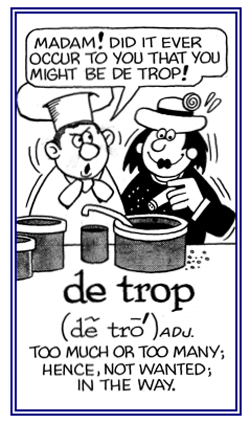de-
(Latin: from, away from, off; down; wholly, entirely, utterly, complete; reverse the action of, undo; the negation or reversal of the notion expressed in the primary or root word)
Functioning or existing in fact, regardless of legal, or illegal, status. It differentiates that which exists in fact (de facto) from what exists legally (de jure).
This well-known expression suggests that taste is a personal matter. Usually no amount of persuasion can succeed in changing a person's taste so it is better not to argue about matters of personal preference.
This saying is sometimes given as De gustibus et coloribus non disputandum, or more often merely as de gustibus, "concerning tastes".
The head of the government is trying to create a de jure state with one party in charge.
Also, "Don't bother me with petty matters." A praetor [PREET uhr] in ancient Rome was a magistrate who assisted the consuls by administering justice and commanding armies.
A related expression is the legal precept: De minimis non curat lex or "The law does not concern itself with trifles" or "The law does not care for, or take notice of, very small or trifling matters"; which is used to justify refusal by a court, particularly an appellate court, to hear a suit, on the basis that a court's time must not be taken up with matters of small importance.
Provision is made under certain criminal statutes for dismissing offenses that are de minimis.
The phrase, de minimis, also explains why income tax payments that are a few dollars short of what they should be are sometimes accepted without any complaint.
Another translation: "Speak kindly of the dead." It is believed that Chilon of Sparta, one of the wise men of sixth-century B.C. Greece, is the author of this saying. Keep in mind that this would be a Latin translation of what Chilon said in Greek.
The advice to everyone is to speak well of the recently dead or, if you can not say anything good, to keep quiet.
It was Persius, the first-century A.D. Roman poet, who stated in his Satires that effort is required to produce anything of value. He also said that anything once produced can not become non-existent again, when he wrote: In nihilum nil posse reverti or "There is nothing that can be reduced to nothing."
Like de integro, de novo is an expression used in describing a fresh start; as in, "I'm sorry about what I said yesterday, let's start de novo."



